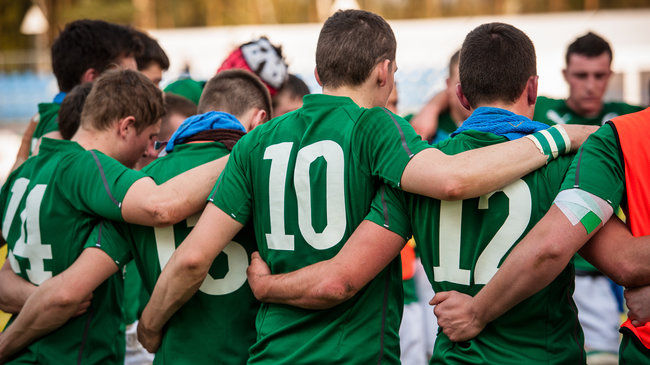Eat2Compete – How To Maximise Your Off Season

National Team Nutritionist Ruth Wood-Martin has prepared an handy guide for young rugby players called Eat2Compete. Here she takes a look at nutrition in the off season.
With the summer months upon us, now is a great time to take stock and think about how you maximise the off-season.
The off-season presents an opportunity to take a break both physically and mentally from the busy season just passed and to re-charge your batteries ahead of next season.
Nutrition should play a key part in any off-season activity so that you can get the most out of what you eat in order to stay in good shape over the summer.
Take a Break
Taking a few weeks off to let the body and mind rest and rejuvenate should be the summer’s first priority. The best nutritional advice during this down period is to eat well but not to use it as a chance to ‘pig-out’.
Your energy expenditure (that is, the amount of calories you use up) will probably be less now that you are no longer training as often or at the same intensity as you have been during the season.
So you will need to take in less energy i.e. less calories. The best way to do this is to reduce the amount of snacking and trimming down the size of your main meals.
Remember that many take-away foods are high in fat and calories so control your intake.
Set a Goal
After you have taken a few weeks off to re-charge your batteries you will be eager to get back into some training so that you can hit the ground running when the new season kicks-off.
You may have been set some goals that might include increasing muscle mass, reducing body fat, maintaining aerobic fitness and improving speed. Getting your diet right will help you achieve these goals.
Increasing Muscle Mass
Results don’t happen overnight and it is important to remember that muscle development takes time. A big increase in weight on the scales in the off-season is more likely to be fat weight gain when training volumes are lower.
To gain muscle, you need more calories to allow them to grow and this means you need to be smart about what you eat to prevent unnecessary fat gain while still providing enough calories for muscle growth.
Be realistic – gaining a couple of kilos is the most you should be aiming for over the summer period.
Tips for Gaining Body Weight
Eat more often if you can’t eat a lot. Fit snacks in between breakfast, lunch, dinner and at bed time (check out the IRFU Snack List fact sheet – https://www.irishrugby.ie/downloads/Snack_list.pdf
Increase the nutrition value of foods by
- Adding peanut butter, honey or jam to breads or toast
- Using yogurt and honey in smoothies (IRFU smoothie fact sheet https://www.irishrugby.ie/downloads/Smoothie.pdf )
- Adding skimmed milk powder (eg Marvel) to milk drinks
Make sure you are well fuelled before doing any exercise – carbohydrates are the key foods you need to get the best quality out of your session.
Remember to refuel after exercise – keep some tasty snacks in your kit bag.
Drink plenty of fluids – include milk, juices, milkshakes and smoothies as well as water
Trimming Body Fat
The off-season is a good opportunity to reduce some body fat, and if this is a priority for you, then it might mean that you will lose some overall body weight.
This is ok, as losing fat while maintaining muscle mass will mean you should maintain your strength and power.
Again it is important to set a realistic goal for weight loss over the summer period. If you lose too much, than the chances are that you will have lost muscle mass which defeats the purpose.
You should aim to lose no more than ½ a kilo of weight a week.
Tips for Losing Body Fat
- Reduce portions of the meal sizes as well as snacks. Make sure you include fruit on your snack list
- Only eat till you are full –try not to over eat
- Keep fat intake low; be sparing with butter, margarine, oil in cooking, fat on meat and fried foods
- Be careful of hidden fats in processed foods like biscuits, cakes, doughnuts, pastries, processed meats, salami and takeaways
- Increase the amount of vegetables or salad in your meals
- Don’t cut out particular foods or food groups you need regular intake of carbohydrate and protein foods
- Drink plenty of water during the day – keep sweet drinks to a minimum
Sports Supplements
There is no need to take any sports supplements for you to achieve your goals.
You will get all the nutrients (that, is carbohydrate, protein, fat, vitamins and minerals) from eating a wide variety of different foods.
Sports supplements can be expensive and there is no evidence that they give advantages over whole foods.
Stick to the food-first approach.
For more information and factsheets on how to get your nutrition right go to the IRFU’s Eat to Compete online resource https://www.irishrugby.ie/eat2compete

